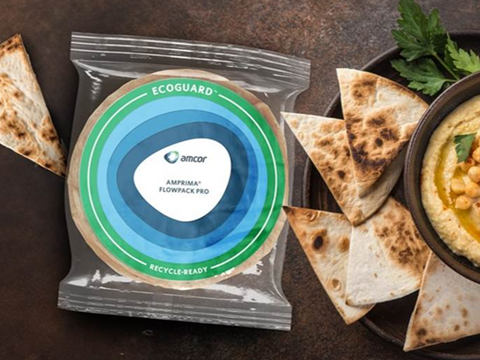
Amcor has launched its AmPrima Flowpack Pro solution for bakery products, said to achieve a carbon footprint reduction of up to 82% compared to traditional packaging solutions, up to 77% reduction in non-renewable energy use and up to 89% reduction in water consumption.
Amcor states these figures are based on its ASSET Life Cycle Assessment, with the comparison based on cradle to grave analysis of 12 PET // 30 PEP packaging vs 30μm oPP PDX, assuming 100% incineration for the baseline packaging and 100% mechanical recycling for the proposed packaging.
The mono-material and ‘recycle-ready’ solution aims to help overcome the bakery sector’s reliance on non-recyclable packaging. Reportedly, it is also the first recycle-ready flexible packaging solution with no EVOH and PVDC available on the market for flatbread.
Amcor says that previously, the bakery sector has relied on non-recyclable packaging containing coatings such as PVDC to provide the oxygen barrier required for storing bakery products. The company states its AmPrima Flowpack Pro solution has ‘excellent sealing and barrier properties’ and may also help brands minimize Extended Producer Responsibility (EPR) fees and plastic taxes through its lightweight design.
Amcor adds that the new packaging is suitable for applications such as flatbread and packed pastry. It was developed at the Amcor Flexibles site in Ledbury, UK.
“We are committed to helping bakery producers and retailers move closer to their sustainability goals and meet the rising expectations of consumers for more sustainable packaging. This is also an exciting development for Amcor, as we continue to progress towards our pledge to develop all our packaging to be recyclable or reusable by 2025,” commented Vitor Mota, product development director at Amcor.
Earlier this month, UPM Specialty Papers and Eastman created a pack for food applications requiring grease and oxygen barriers with a compostable, biopolymer coating. Due to the thinness of the coating layer, the companies say that the solution is ‘designed for recycling’ within existing fibre recycling streams.
Also in November, Walki entered a strategic partnership with Lactips to create ‘fully biodegradable, plastics-free’ food packaging using natural polymers, designed to be to be fully recyclable in the paper stream. Apparently, Lactips will provide Walki with the casein-based polymer, while Walki will conduct pilot trials on the extrusion line in its Technical Competence Center in Pietarsaari, Finland.
If you liked this story, you might also enjoy:
The ultimate guide to the Packaging and Packaging Waste Regulation in 2024
How are the top brands progressing on packaging sustainability?
Sustainable Innovation Report 2024: Current trends and future priorities
Everything you need to know about global plastic sustainability regulation













No comments yet